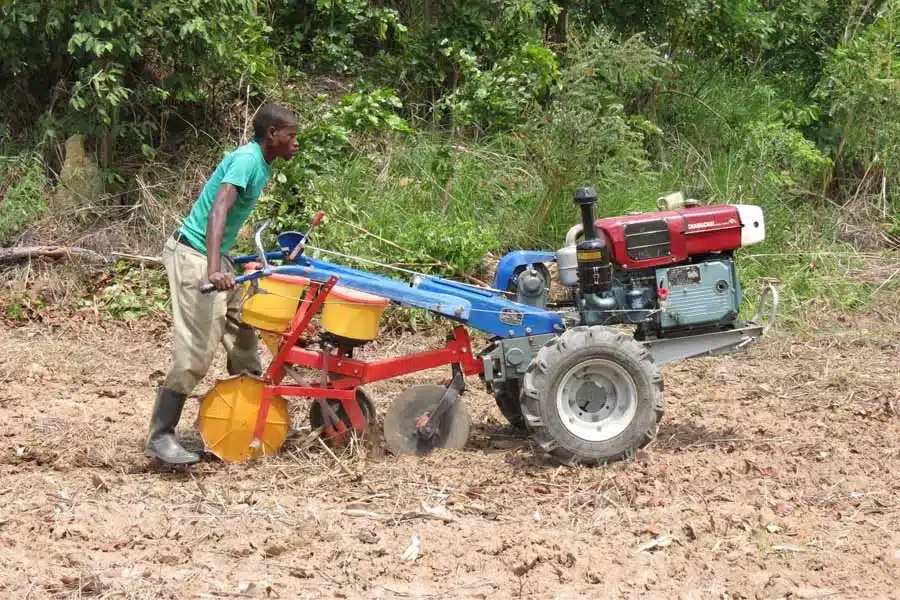Farming lies at the heart of Zambia’s economy, with a significant portion of the population engaging in agricultural activities. The sector plays a crucial role in contributing to food security, employment, and foreign exchange earnings. In such a landscape, the adoption of innovative agricultural machinery is not just a luxury but a necessity, particularly for small-scale farmers. This is where walking tractors come in, offering multifaceted benefits that can modernize and optimize farm operations.
The Rise of the Walking Tractor in Zambian Agriculture
Walking tractors, also known as two-wheel tractors, have surged in popularity in Zambia, addressing the critical need for mechanization among smallholder farmers. These compact powerhouses offer versatility, efficiency, and affordability – qualities that resonate with the challenges faced in Zambia’s agriculture sector. With the capacity to perform a range of tasks from ploughing to transportation, these machines are a boon to farmers looking to scale up their operations without incurring exorbitant costs.
The Multitude of Tasks a Walking Tractor Can Tackle
One of the most compelling aspects of a walking tractor is its adaptability. It can be used for ploughing, harrowing, seeding, cultivating, and transportation of goods, rearranging the traditional narrative of labor-intensive farm work. This versatility not only saves time but also enables the cultivation of a wider array of crops, encouraging diversification among Zambian farmers.
Technical Advancements Tailored to Zambian Needs
In many parts of the country, the terrain varies significantly, from rolling hills to fairly flat regions. Modern walking tractors come with adjustable wheels and implements designed to tackle these varying landscapes. Also, with many Zambian soils slightly more acidic, the machinery available in the market is tailored to handle these conditions, offering the necessary specialized tilling and fertilization options.
The Economic Case for Walking Tractors in Zambia
Economic viability is often the pivot point for any new investment, especially for small-scale farmers. Walking tractors offer strong returns on investment, swiftly replacing the manual, animal-drawn equipment used traditionally in farming.
Reduced Labor Costs and Increased Output
By automating labor-intensive tasks, walking tractors frees up human resources and reduces dependency on hired labor. This cost-saving advantage can be substantial, particularly during peak farming seasons. Additionally, the efficiency gains translate into increased productivity and, consequently, higher farm output.
Environmental and Social Benefits
The impact of walking tractors goes beyond economics. These machines are inherently eco-friendly, being highly fuel-efficient and less polluting than their larger, more powerful counterparts. Their adoption reduces the carbon footprint of farm operations and aligns with global efforts towards sustainability.
Health and Safety for Farmers
Traditional farming techniques, which involve manual or animal-drawn ploughs, can be physically demanding and pose risks to the farmer’s health. Walking tractors offer a safer alternative, with ergonomic designs and safety features, reducing the risk of injuries and long-term physical strain. This, in turn, contributes to a healthier and more productive farming community.
Empowerment and Community Development
The introduction of walking tractors symbolizes progress and can lead to communal development. When farmers invest in this technology, they are not just upgrading their individual farms – they are participating in the modernization of the entire agricultural sector. This fosters a sense of empowerment and community growth, encouraging knowledge sharing and a collective push towards more advanced farming practices.
Continuous Innovation and Research
Innovation should be an ongoing process, driven by the needs and challenges faced on the ground. By investing in research and development, the agricultural sector can stay ahead, offering cutting-edge solutions tailored to the Zambian context.

The walking tractor represents more than just a farming tool; it is a catalyst for development, efficiency, and sustainability. For Zambian farmers, the benefits of investing in this technology are numerous – from economic empowerment to environmental stewardship. By spearheading the walking tractor revolution, Zambia’s farmers can pave the way for a more modern, productive, and prosperous agricultural sector.
